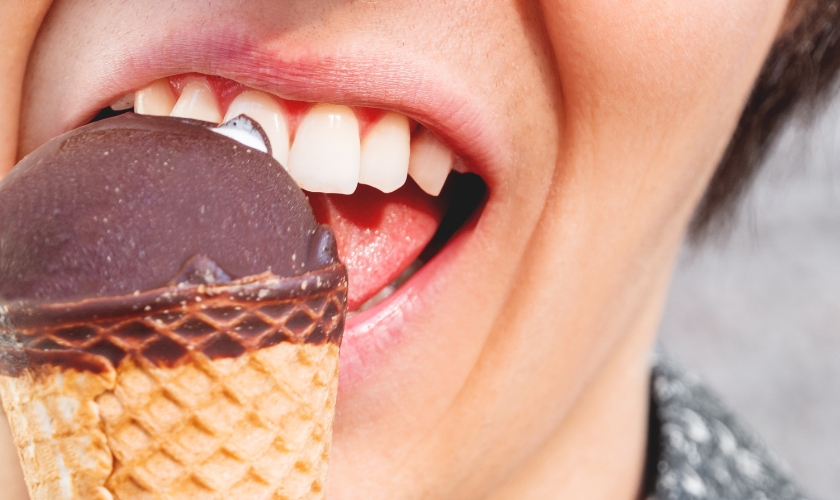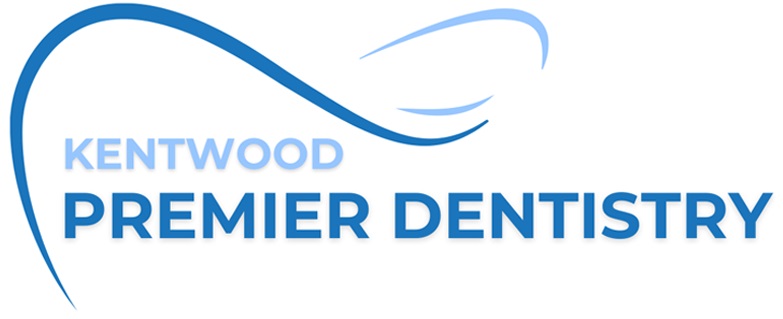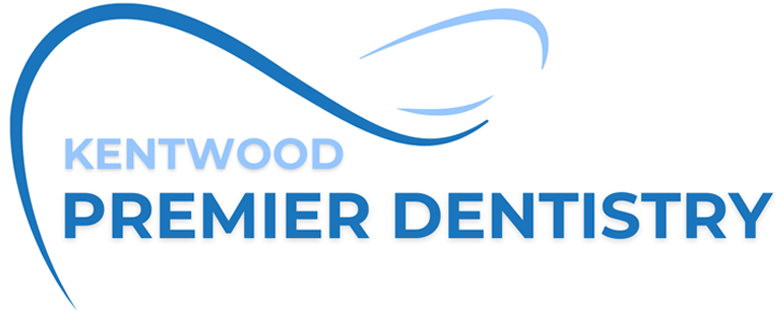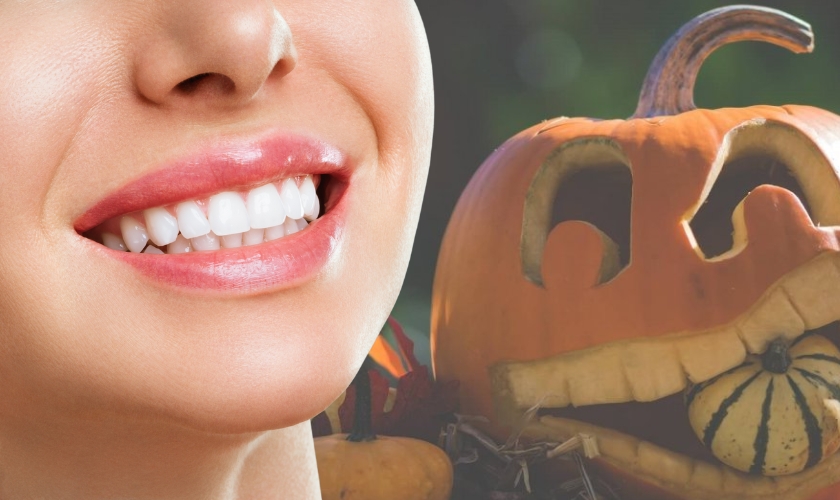Kentwood, MI

The Ultimate Guide to the Worst Foods for Your Teeth

Our teeth are the workhorses of our digestive system, breaking down food into manageable pieces for our bodies to absorb nutrients. But just like any other part of our body, teeth need proper care to function optimally. Food plays a crucial role in maintaining good oral health. What we eat and drink directly impacts the health of our teeth and gums.
Let’s delve into how food interacts with our teeth and gums:
The Powerhouse of Your Mouth: Teeth and Gums
Our teeth are made of tough enamel, the hardest substance in the human body. Beneath the enamel lies the dentin, a softer layer that contains nerves. The gums, on the other hand, are the soft tissues that surround and support our teeth. Healthy gums fit snugly around the teeth, forming a tight seal that prevents bacteria from entering.
The Saliva Superhero: Keeping Your Mouth Clean and Moist
Saliva is our mouth’s natural defense system. This incredible fluid constantly washes over our teeth and gums, performing several vital functions:
- Neutralizes Acid: Saliva contains minerals that help neutralize acids produced by plaque bacteria, which can erode tooth enamel.
- Washes Away Debris: Saliva washes away food particles and bacteria, preventing them from building up on teeth and causing cavities.
- Aids Digestion: Saliva contains enzymes that begin the breakdown of carbohydrates, helping us digest food more efficiently.
- Food Fight: How Different Foods Interact with Your Teeth
The types of food we eat significantly impact the environment in our mouth. Let’s explore how different food groups interact with our teeth and gums:
- Acidic Foods and Drinks: Citrus fruits, tomatoes, and carbonated beverages are acidic. While these foods offer essential vitamins, frequent consumption can erode tooth enamel over time.
- Sugary Foods and Drinks: Sugary treats like candy, cookies, and sodas provide a feeding ground for harmful bacteria in the mouth. These bacteria thrive on sugar and produce acids that attack tooth enamel, leading to cavities.
- Starchy Foods: White bread, pasta, and chips are high in refined carbohydrates. Our bodies break down these carbohydrates into sugars, which can have the same negative effects on teeth as sugary treats.
Understanding how food interacts with your teeth is the first step towards making informed dietary choices to promote a healthy smile.
The Top Culprits: Worst Foods and Drinks for Your Teeth
While we all enjoy indulging in our favorite treats, certain foods and drinks are notorious for wreaking havoc on our teeth. Here’s a list of the top offenders and why they should be limited for a healthy smile:
Sugar Showdown: The Sweet Villains
- Candies, Cookies, and Cakes: These sugary treats are a triple threat. They are loaded with sugar, often sticky, and can cling to teeth for long periods, allowing bacteria to feast and produce cavity-causing acids.
- Sodas and Juices: These beverages are packed with sugar and are often acidic, creating a double whammy for your teeth. The sugar feeds bacteria, and the acidity erodes enamel. Even diet sodas, while sugar-free, contain citric or phosphoric acid, which can weaken tooth enamel over time.
Starch Attack: The Sneaky Sugars
- White Bread, Pasta, and Rice: These refined carbohydrates are quickly broken down into sugars in our bodies. The constant sugar presence provides a breeding ground for bacteria and can contribute to cavities. Opt for whole-wheat versions or brown rice whenever possible, as they release sugars more slowly.
Acid Aficionados: The Enamel Eroders
- Citrus Fruits and Juices: Oranges, grapefruits, and lemons are great sources of Vitamin C, but their citric acid content can erode tooth enamel. If you enjoy citrus fruits, consume them in moderation and rinse your mouth with water afterward.
- Coffee (Black) and Tea: While not as sugary as sodas, black coffee and tea can be acidic and stain teeth. Limit your intake and consider adding a splash of milk or cream to reduce the acidity.
Sticky Situation: The Clingy Culprits
- Gummy Bears, Fruit Snacks, and Dried Fruits: These chewy treats may seem like a healthy option, but their sticky nature allows them to cling to teeth for extended periods, exposing them to sugar for a longer time. Fresh fruits are a much better alternative.
The Chipping Challenge: Hard Candies and Ice
- Hard Candies and Sucking on Ice: These habits can crack or chip teeth, especially if you have weakened enamel. Choose softer candies, and avoid using your teeth to chew on ice.
Dehydration Duo: Alcohol and Sugary Sports Drinks
- Alcohol: Alcoholic beverages can dehydrate your mouth, reducing saliva production. Saliva plays a vital role in washing away food particles and neutralizing acids. Reduced saliva flow creates a perfect environment for bacteria to thrive.
- Sugary Sports Drinks: While formulated for hydration during exercise, many sports drinks are loaded with sugar and can be acidic. Opt for water as your primary hydration source during workouts.
By understanding these top culprits and making informed choices, you can significantly reduce your risk of tooth decay and gum disease.
Healthy Alternatives for a Smile-Savvy Diet
Maintaining a healthy smile doesn’t mean sacrificing flavor or variety in your diet. Here are some delicious and smile-friendly alternatives to the worst foods for your teeth:
Sweet Treats with a Smile
- Sugar-Free Gum: Chewing sugar-free gum after meals can increase saliva production, helping to wash away food particles and neutralize acids. Look for gum sweetened with Xylitol, a natural sugar alcohol that can actually inhibit the growth of harmful bacteria.
- Dark Chocolate: In moderation, dark chocolate (at least 70% cocoa content) is a tooth-friendly treat. Dark chocolate contains less sugar than milk chocolate and some studies suggest it may even have some antibacterial properties.
Fruits and Vegetables: Nature’s Toothbrush
- Apples, Carrots, and Celery: These crunchy fruits and vegetables act like nature’s toothbrush. Chewing them increases saliva flow, which helps to remove food particles and freshen breath. They are also packed with vitamins and minerals that contribute to overall oral health.
Dairy Powerhouses: Building Strong Teeth
- Cheese and Yogurt: Dairy products are rich in calcium and casein, which help strengthen tooth enamel and rebuild weakened areas. Choose plain yogurt over flavored varieties to avoid added sugar. Cheese also stimulates saliva production, which helps to wash away food particles.
Lean Protein: Building Blocks for a Healthy Smile
- Fish, Chicken, and Beans: Lean protein sources are essential for overall health, including oral health. They provide essential nutrients that contribute to strong teeth and gums. Fish, especially fatty fish like salmon, are also rich in omega-3 fatty acids, which can have anti-inflammatory benefits that may help with gum health.
Hydration Hero: Water is Always the Best Choice
- Water: Water is the single most important beverage for your overall health, including your oral health. It keeps you hydrated, promotes saliva production, and helps to wash away food particles and bacteria. Aim to drink plenty of water throughout the day, especially after meals and sugary snacks.
Making these simple swaps can significantly reduce your risk of tooth decay and gum disease. However, a healthy smile goes beyond just diet.
Maintaining a Healthy Smile Beyond Diet
Diet plays a crucial role in oral health, but it’s not the only factor. Here are some essential habits to incorporate into your routine for a healthy smile:
Brushing and Flossing: A Powerful Duo
- Brushing: Brush your teeth twice a day for two minutes each time. Use a soft-bristled toothbrush and fluoride toothpaste. Be sure to brush all surfaces of your teeth, including the backs and your tongue.
- Flossing: Flossing daily removes plaque and food particles from between teeth, where your toothbrush can’t reach. Proper flossing technique is essential to ensure you’re effectively cleaning these areas.
Fluoride: Your Enamel’s Best Friend
Fluoride is a mineral that helps strengthen tooth enamel and prevent cavities. Look for fluoride toothpaste and consider using a fluoride mouthwash as well. If you live in a community with fluoridated water, that’s an added bonus for your oral health.
Regular Dental Checkups: Prevention is Key
Schedule regular dental checkups and cleanings, typically every six months. These visits allow your Kentwood dentist to identify and address any potential problems early on, preventing more serious issues down the road. Professional cleanings remove plaque and tartar buildup that brushing and flossing alone can’t reach.
Lifestyle Habits: Making Smart Choices
- Smoking Cessation: Smoking is a major risk factor for gum disease and oral cancer. Quitting smoking is one of the best things you can do for your overall health, including your oral health.
- Limiting Alcohol Consumption: Excessive alcohol consumption can contribute to dry mouth and increase the risk of oral health problems. Moderate your alcohol intake and drink plenty of water in between alcoholic beverages.
By following these practices along with a smile-friendly diet, you can significantly improve your oral health and maintain a beautiful smile for years to come.
Final Thoughts
Achieving a healthy smile for life is a combination of smart choices and consistent habits. Limiting sugary treats, starchy carbohydrates, and acidic foods while incorporating water, fruits, vegetables, dairy, and lean protein keeps your smile happy. Brushing twice a day with fluoride toothpaste, flossing once daily, and using fluoride mouthwash strengthen and clean teeth. Regular dental checkups with cleanings in Kentwood ensure professional evaluation and preventive care. Finally, quitting smoking, limiting alcohol, and maintaining a healthy diet contribute to overall well-being and a bright, healthy smile. So take charge of your oral health today – a beautiful smile is just the beginning!
Frequently Asked Questions
Fresh fruits are a healthy part of a balanced diet and provide essential vitamins and minerals. While some fruits do contain natural sugars, they also contain fiber, which helps to stimulate saliva production and can actually cleanse your teeth to some extent. Enjoy fruits in moderation and rinse your mouth with water after consuming particularly acidic fruits like oranges or grapefruits.
For optimal oral health, you should brush your teeth twice a day for two minutes each time. Use a soft-bristled toothbrush and fluoride toothpaste. Flossing once a day is also essential to remove plaque and food particles from between teeth. Proper flossing technique is important – ask your dentist for guidance if needed.
Some signs of tooth damage caused by food include tooth sensitivity, pain, discoloration, chipping, or visible cracks. If you experience any of these symptoms, it’s important to schedule a dental appointment to get a proper diagnosis and treatment plan.




